
6 in 10 Gen Zers use telehealth to treat mental illness, but just 2 in 10 Boomers.
Key Findings
85% of Americans who use wearable technologies think they helped improve their health
82% of telehealth users had a positive experience
64% of Gen Z use telehealth for mental health issues, compared to 18% of Baby Boomers
45% say Artificial Intelligence in healthcare is trustworthy
20% say their health data privacy has been violated
HealthCare.com’s 2022 Health Technology Survey shows 85% of Americans who use wearable technologies think they helped improve their health.
82% of telehealth users say it was a positive experience.
64% of Gen Z use telehealth for mental health issues, but just 18% of Baby Boomers.
45% say Artificial Intelligence in healthcare is trustworthy.
But 20% say their health data privacy has been violated.
Scroll down for the full results of HealthCare.com’s Health Technology Survey 2022.
Health-Tech Survey 2022
Wearables
43% of Americans have used a wearable device to monitor their health, compared to 52% who have not and 5% who are unsure. Among these Americans, the top three devices are smartwatches/wristbands (77%), smart glasses (15%), and smart clothing (14%).
That’s according to a new health technology survey of 1,039 U.S. adults conducted by HealthCare.com on November 21st.
Most users of wearable devices monitored their heart rate (65%), followed by fitness goals and sleep, tied at 43%. Older generations are more likely to monitor their heart rate, while younger generations are more likely to monitor their menstrual cycle.
The survey shows widespread acclaim for wearables’ health benefits. 85% of respondents who use wearable technologies think they helped improve their health somewhat or a lot, with Millennials and Gen Zers the most bullish.
Trust in wearable devices is high. 84% of users trust providers of wearables either somewhat or a lot to keep their health data private and secure, and 78% would share personal health data from a wearable device with their doctor.
Meanwhile, 30% of wearable owners received a reward or incentive from their health insurer to purchase a wearable device. Despite the rewards and incentives, 36% of those who didn’t use wearables say they didn’t use them because they’re too expensive.
Telehealth
Compared to wearable devices, telehealth usage among Americans is higher. 53% report having used telehealth, and the percentage is consistently close to 50% across generations.
Looking at telehealth more closely, our survey finds that 75% of respondents used telehealth for physical issues, 39% for mental health issues, and 13% for both. In general, older generations are more likely to use telehealth for physical issues, while younger Americans are more likely to use it for mental health.
Telehealth Use by Generation
Support for telehealth is as high as it is for wearables. 82% of Americans call their experience with telehealth somewhat or very positive.
Compared to in-person doctor visits, 47% of respondents who use telehealth say its level of care is somewhat or much better, versus 24% who say it’s somewhat or much worse than in-person visits.
Looking at outcomes, 46% of this group say telehealth’s medical outcomes are somewhat or much better, compared to 18% who say telehealth’s outcomes are somewhat or much worse. Blacks are more likely than whites to say telehealth’s level of care and outcomes are better than in-person doctor visits.
60% of Americans who use telehealth say they are likely to continue using it, a number that rises to over 90% for Gen X, Gen Z, and Millennials.
Some barriers remain, however. 17% of Americans say their internet connection is not good enough for a telehealth video visit, including more than 1 in 5 Gen Zers, Gen Xers, and Millennials. Overall, Asians, Pacific Islanders, Blacks, and Hispanics/Latinos are more likely to lack good internet connections.
Artificial Intelligence
Compared to wearable technology and telehealth, experience with artificial intelligence (AI) in healthcare settings remains low.
While it’s unclear how many Americans know when AI is used in their healthcare, 69% of respondents say they have not experienced medical treatment that uses AI. That compares to 20% who say they have experienced AI in treatments and 11% who are unsure.
Looking at age groups, younger generations are more likely to report experiencing AI in treatment. 33% of Gen Zers and 29% of Millennials say they experienced AI in medical treatments, compared to 21% of Gen Xers and 7% of Boomers.
Among 8 possible AI uses in healthcare, the top three reported by pollees are virtual health assistants (33%), targeted treatments (30%), and diagnosis of blood diseases (21%).
Among 12 possible promising future uses for AI, Americans look first to management of medical records (26%), followed by virtual health assistants (25%), and improved healthcare access (25%). The greatest number of Americans, however, are unsure (28%) of the most promising uses of AI in healthcare.
Trust of AI in healthcare is lower than that for wearables and telehealth, but still higher than distrust of AI in healthcare. 45% of respondents say the use of AI in healthcare is somewhat or very trustworthy compared to 15% who say it’s somewhat or very untrustworthy. 21% of Blacks rate AI in healthcare very trustworthy, compared to just 13% of whites.
Data Security
Trust in health data security is less robust than for wearables and telehealth, but like that in AI, is still favorable.
49% of Americans are willing to share personal health information online, compared to 32% who aren’t and 19% who are unsure. Gen Zers are less likely to share personal health info online (39%) versus close to 50% for Millennials, Gen Xers, Baby Boomers, and the Silent Generation.
46% of respondents who use websites to manage or receive health information trust their security, compared to 20% who don’t trust them. 25% don’t use websites at all to manage their health information, and 9% are unsure.
20% of Americans say the privacy of their health data has been violated, compared to 65% who say their health data privacy wasn’t violated and 15% who are unsure. Gen Zers (27%) and Millennials (27%) are more likely to say they experienced data privacy violations. Meanwhile, 24% of women say their health data privacy was violated, compared to 14% of men.
When it comes to making doctor appointments, 43% of respondents prefer to schedule visits online, compared to 57% who prefer to make appointments by phone.
Methodology
HealthCare.com conducted this survey on November 21, 2022, utilizing a SurveyMonkey Audience to poll a national sample of 1,039 18+ U.S. adults. The margin of error for this survey is plus or minus 3.0 percentage points. The sample was balanced for age, gender, and U.S. region according to the Census Bureau’s American Community Survey.




